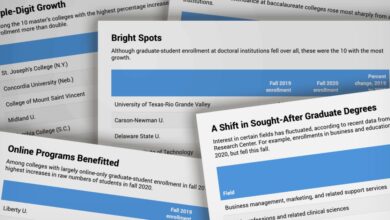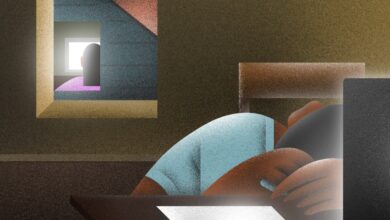NCAA Punishes Baylor U., but Not for Mishandling Sexual Violence

[ad_1]
In 2016, charges of sexual assault against two standout football players at Baylor University led to a reckoning at the world’s largest Baptist university. An internal report found a “fundamental failure” to uphold Title IX, the federal gender-equity law, and led to the departure of the president and chancellor, Kenneth W. Starr; the head football coach, Art Briles; and the athletics director, Ian McCaw.
Now, more than five years after several women came forward with those accusations, the National Collegiate Athletic Association has weighed in.
The association’s Committee on Infractions released a ruling on Wednesday in which it issued penalties for recruiting violations in the Baylor football program. The committee said it had no authority to punish Baylor for its acknowledged and well-documented mishandling of reported sexual violence.
“Baylor admitted to moral and ethical failings in its handling of sexual and interpersonal violence on campus,” the committee wrote in its report, “but argued those failings, however egregious, did not constitute violations of NCAA rules.”
“Ultimately, and with tremendous reluctance, this panel agrees,” the report says.
The sanctions include a $5,000 fine, some limits on recruiting football players during the 2021-22 academic year, and vacating five wins from the 2011 football season. In addition, a former assistant director of football operations will be barred from “any athletically related duties” unless the institution that employs him can “show cause why the restrictions should not apply.”
In a videoconference with reporters, Baylor officials said that they found the sanctions reasonable and that they had made significant changes in how they handle accusations of sexual misconduct.
Mack B. Rhoades IV, vice president and director of intercollegiate athletics, called the committee’s ruling “fair” and said the university was unlikely to appeal the penalties, though it has 15 days to consider that possibility.
Linda A. Livingstone, Baylor’s president since June 2017, told reporters the punishments “pale when compared to the impacts on sexual-assault survivors and the many lives that have been forever impacted.”
“I can confidently say,” she said, “that Baylor is a much different university today than it was three, five, and certainly 10 years ago, as we seek to bring light to the world as a pre-eminent Christian research university.”
‘Still Disappointed’
The ruling against Baylor is just the latest in which the NCAA has concluded that it cannot necessarily punish colleges even for what appears to be gross misconduct by athletes, coaches, or administrators who oversee athletics.
In 2017, for example, the association ruled that the University of North Carolina at Chapel Hill had not violated NCAA rules, despite a report that over two decades more than 3,000 students — nearly half of them athletes — had taken sham courses that awarded generous grades for little or no coursework.
While UNC had acknowledged a problem with the courses, one of its responses to the NCAA was that the courses were not an impermissible benefit to athletes because so many other students had also participated in the scheme.
In defending itself to the NCAA, Baylor made a similar argument: “The panel found that those instances of nonreporting [of sexual violence] did not constitute impermissible benefits to football student-athletes because of a campuswide culture of nonreporting,” the committee concluded.
Jessica W. Luther was one of the journalists who broke the story of the criminal trial of one of those football players, Samuel Ukwuachu, who was found guilty of second-degree sexual assault in August 2015.
Luther, now a fellow in the Center for Sports Communication and Media at the University of Texas at Austin, said she was “unsurprised” by the committee’s ruling but “still disappointed.” The association “has no way to punish a program when it comes to failures to handle gender violence appropriately,” she said, even when some of the assault victims were also athletes.
“It’s clear the NCAA exists only to protect certain people and mainly institutions,” Luther said, “and I just feel very badly right now thinking of the student-athletes at Baylor.”
‘Pain and Hurt’
Livingstone said the NCAA’s ruling may be seen as a slap on the wrist by some, but it’s just one measure of accountability the university faces.
Baylor was fined nearly $462,000 by the U.S. Department of Education for violations of the Clery Act — the federal law that requires higher-education institutions to document and report allegations of crimes on or near campus.
The Education Department also has opened seven investigations of alleged violations of Title IX since 2016. The most recent inquiry began in June 2021, according to the department’s website.
The university is also defending itself in court against four civil lawsuits involving 15 female plaintiffs who allege Baylor violated their Title IX rights.
Asked by a reporter what message she wanted to send to the litigants whom Baylor continues to oppose in the courtroom, Livingstone said she “regrets the pain and hurt that it caused many along the way in that process, and we certainly want to continue to do everything we can to prevent these kinds of incidents going forward.”
“Our hearts go out to these victims and what they’ve experienced,” she said, “and so we hope that folks understand we’ve learned from this, we have made lots of changes from it.”
[ad_2]
Source link






